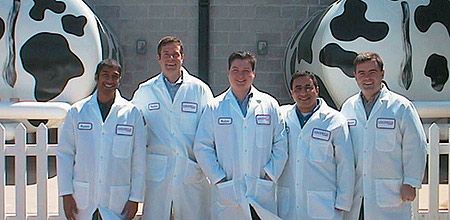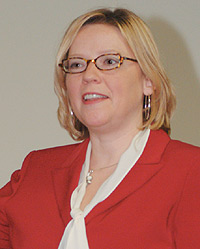|
Page 1, 2, 3
Kellogg – Creating
leaders who care (cont'd)
Think globally, act locally
While rigorous academic programs such
as BASE and the Public/Nonprofit Program often take a “big
picture” look at the business world, Kellogg is
also a culture that makes a difference closer to home
too.
Kellogg students learn how to run a nonprofit
organization or lead a global firm through the challenges
of nonmarket and market forces. But as they study, most
Kellogg scholars throw themselves into an assortment of
volunteer efforts through the school’s vibrant student
clubs.
The Social Impact Club, for instance, brings
nonprofit leaders to campus with its Fall
Speakers Series, as well as its annual Innovating Social
Change Conference. The club also sees itself as engaged
in an outreach mission to educate Kellogg students about
the ways their leadership can play a role in public and
nonprofit arenas.
"Kellogg is a leadership school, and
the MBA is a leadership degree,” says Stacy McAuliffe ’04,
the club’s marketing and communication officer. “The
Social Impact Club is in a position to understand the for-profit
and nonprofit worlds, creating a dialogue between students
in both.”
Club President Jessica Watson ’04
notes that Kellogg students are “attuned to the nonprofit
sector, even if they’ve never worked there.” She
views the club’s mission as “tapping the civic
nature of our peers, who are already open to exploring
the world of nonprofit, even if they may not fully go into
a nonprofit career.”
Both students believe it important for MBAs
to realize the many ways that business and the public interest
interact, beyond the basic categories of for- and nonprofit — investing
in small businesses working in low-income areas, for instance.
"An important component of being a leader
is impacting the world around you, not just concerning
yourself with your own wealth,” says Watson.
Other clubs, such as Business with a Heart,
provide an umbrella under which Kellogg students perform
a number of service missions. BWAH engages in tutorial
and youth programs such as those involving the YMCA and
Junior Achievement; outreach programs such as Christmas
in April, Connections for the Homeless, Special Olympics,
Habitat for Humanity and the Neighborhood Business Initiative;
and special events such as food, clothing and blood drives,
and annual Kellogg charity events that include Toy Drive
and the Charity Auction Ball (the latter has raised as
much as $70,000).
With Kellogg initiatives such as the Learning
Through Experience and Action Program (LEAP) and Kellogg
Corps (the program that sent Levenberg and McDaniel
to Africa), students and recent graduates put their leadership
skills to work in a variety of settings, including within
nonprofit and nongovernmental contexts.
 |
| From
left to right: Sri Kaza, Mark Klossner, Ignacio Felix,
Farrokh Batliwala and Daniel Garcia (all ’04),
at the Oberweis Dairy plant in North Aurora, Ill. As
part of the Kellogg LEAP course, the students partnered
with Oberweis to develop a model that would accurately
forecast short-term demand and help the firm manage
its weekly production. |
| |
LEAP is a “capstone” course for
many first-year Kellogg MBAs, says Fran Brasfield Langewisch ’95,
assistant dean and director of student life and experiences.
The program pairs students with a variety of organizations — recent
partners include Northwestern Memorial Hospital, The Block
Cinema, Home Depot, BMW and Room to Read, a literacy advocacy
nonprofit founded by Kellogg alum John Wood ’89.
Langewisch says that LEAP’s goal is
to create value for both students — who get to practice
their portfolio of leadership skills in a real-world setting — and
the partner firms, who benefit from having Kellogg School
insights strengthen their organizations.
"Kellogg really stresses leadership
opportunities that give back to the school and the community,” says
Langewisch, noting that Kellogg’s 14 annual student
conferences and its 80 clubs offer a far richer experience
than that of other peer institutions. “We see the
bigger picture here, and teach students the importance
of ethics and leadership both within the workplace and
in the larger community. This is something Kellogg has
always emphasized, and it’s our culture and values
that make us unique.”
Langewisch’s longtime predecessor
in the Office of Student Affairs, Edmund Wilson, is even
more unequivocal: “Kellogg is not a place for fence-straddlers
or spectators,” says Wilson, former associate dean
for student affairs and now ambassador at large for the
school.
Numerous Kellogg School alumni prove Wilson’s
contention each day in the work they do for their communities.
Sharon Durling ’87 is one of them.
Durling lends her expertise to inner city
residents, especially women, looking to learn how to manage
their money better. She presents free financial seminars
and has written a book — A Girl and Her Money — that
combine her passion for philanthropy and finance. Her efforts
are part of a larger outreach by Chicago-based Goodcity,
which helps economically disenfranchised people enter the
economic mainstream.
 |
|
| © Mary
Hanlon |
|
| Sharon
Durling ’87 brings her financial lleadership
to the community by volunteering with Goodcity. |
|
| |
|
Durling says that her audiences — and
not all of them are poor; many are wealthy but have poor
money-management skills — are often amazed to “discover
the wide, wonderful world of savings and compound interest.” The
revelations she helps bring about can have profound and
lasting impact on her clients’ lives.
"I tell my audiences, ‘If you
passed fourth-grade math, you have all the technical skills
to do basic investing,’” she says. “You
should see the looks on their faces when they learn this
stuff is within their grasp.”
Having grown up poor but in a family that
always tried to help those even less fortunate, Durling
says that service to others can broaden one’s perspective
on life. Even those reluctant to give back to the community
for the community’s sake, she insists, should consider
doing so out of self-interest. “The benefits are
immeasurable when you give,” she explains. “Giving
does something to you — spiritually, mentally and
emotionally — that allows you to skip to the office
the next day with a different framework that really impacts
your business leadership in powerful ways.”
For some Kellogg School alumni, though,
skipping is discouraged in their place of employment, at
least during formal office hours.
Sarah Butter ’98 leveraged her Kellogg
School MBA and her Princeton Theological Seminary degree
to become pastor of the First Presbyterian Church of Wilmette.
She explains her thoughts about service for the common
good by citing theologian Frederick Buechner’s belief
that “the place where your deep joy and the world’s
deep hunger intersect, that’s where you are called.”
"For some of us, that intersection happens
in our professional work; for others, that place is discovered
in service or volunteer work,” Rev. Butter says. “In
either case, all of us have the opportunity to touch and
transform lives, and in so doing have our own lives touched
and transformed.”
Page 1, 2,
3 |



